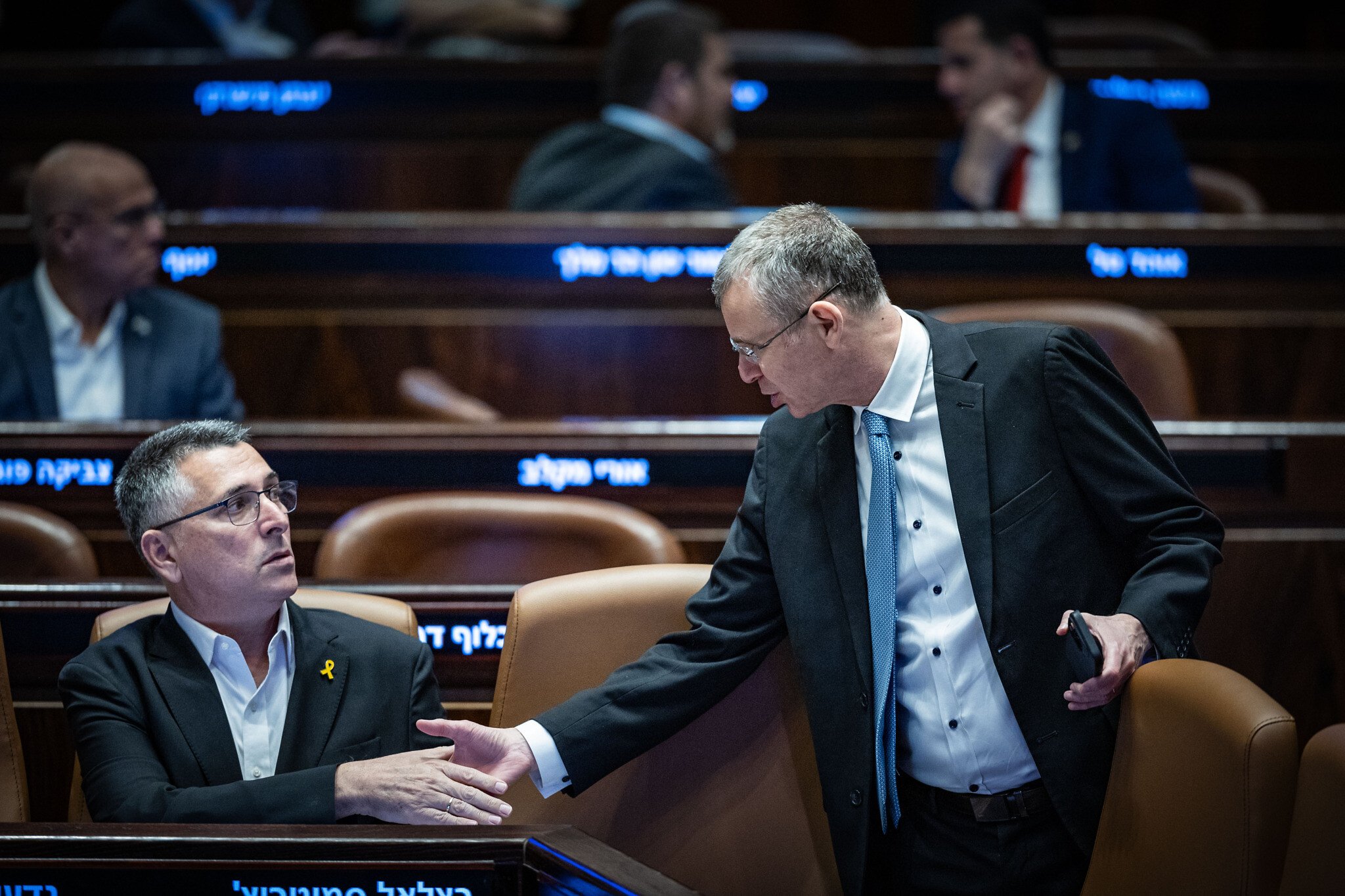



Justice Minister Yariv Levin and Foreign Minister Gideon Sa’ar unveiled a far-reaching package of changes to Israel’s judicial system Thursday which would increase political power over judicial appointments and curb the High Court’s ability to strike down legislation, but would stop short of some measures that sparked massive anti-government protests in 2023.
Opposition leaders held off on immediately commenting on the proposal, which appeared to be a softened version of Levin’s previous attempt to overhaul the judiciary, while others were quick to pillory the package for “politicizing” the judiciary.
Unlike the original overhaul, the moves unveiled Thursday would increase the power of the opposition to block judicial appointments in the critical Judicial Selection Committee. However, it also allows the committee itself to become more politicized by watering down the influence of legal professionals.
Under the proposal, Israel’s quasi-constitutional Basic Laws would also be given more heft through a more rigorous legislative process, but they would not be subject to judicial review by the High Court of Justice, which would also lose some of its oversight powers over regular legislation.
The fresh overhaul proposal marks Levin’s latest attempt to constrain the power of the judiciary, a campaign he launched upon taking office in 2023 with an agenda that would have almost entirely subjugated the judicial branch to the government. The effort was only halted at the last moment due to massive public backlash and protests. The push was shelved following the October 7, 2023, catastrophe, but Levin has attempted to revive it in recent months.
Opposition Leader Yair Lapid and National Unity party head Benny Gantz both refused to respond immediately to the proposal before it could be fully examined, and insisted that a new Supreme Court president be elected regardless of the new package of measures.
Others leveled harsh criticism over the continued attempt to increase political control over judicial appointments. The Israel Bar Association railed against the “total politicization” of Supreme Court appointments, while constitutional scholars expressed concern over the erosion of judicial independence from political masters.
Levin has refused to allow a new Supreme Court president to be appointed for over a year due to his desire to exert greater control over it and has been given a deadline by the Supreme Court, sitting in its capacity as the High Court, to appoint a new president by January 16.
The key component of the new proposals would preserve the representation of the coalition, opposition, and judiciary on the Judicial Selection Committee, but have the coalition and opposition select one attorney each to serve on the panel instead of the Israel Bar Association selecting two of its representatives.
Critically, appointments to the Supreme Court could be made without the vote of any of the three judges on the committee, whereas the current system guarantees a veto over those appointments to both the judiciary and the coalition representatives.
Lower court appointments would require the approval of at least one member of the coalition, opposition, and the judiciary, whereas currently they can be made without votes from either the coalition or the opposition.
But in a situation where there are two open positions on the Supreme Court and over a year has passed without an agreement to fill those spots, both sides would get to appoint one judge they put forward out of a list of three candidates.
In their announcement, Levin and Sa’ar said that the proposal was devised between themselves, together with former cabinet minister Yizhar Shai who was a member of Gantz’s Israel Resilience party, and Brig. Gen. (Res.) Dedi Simchi — both of whom have lost a son during the current war — described the agreement as “a historic correction” that was worked out over the course of a year and a half.
Sa’ar, who served as justice minister in the last government, was a vocal and vociferous critic of Levin’s original judicial overhaul proposals for giving the executive branch too much power over the judiciary, while still backing reforms to the system. He insisted Thursday that the new package he devised with Levin ensured that a governing coalition would need agreement from the opposition to make judicial appointments.
According to the proposal, the number of members on the Judicial Selection Committee would not be changed from nine, as it stands now. The number of coalition members would remain at three, the number of opposition representatives would stay at one, and the number of Supreme Court justices would also remain at three.
The two representatives of the Israel Bar Association would however be removed in favor of two attorneys with experience in litigation, one to be chosen by the coalition and one by the opposition.
The opposition MK on the committee would be chosen in a vote among opposition MKs only, meaning that a majority of opposition MKs would determine who represents it on the panel without input from the coalition.
Judicial appointments to lower courts would be made by a simple majority of five votes on the committee and must include a member of the coalition, an opposition MK or the attorney appointed by the opposition, and a Supreme Court justice.
Appointments to the Supreme Court would also be made by a majority of five and must include a member of the coalition and a member of the opposition. This measure strips the judiciary of a great deal of power and influence over appointments to Israel’s top court since currently a majority of seven out of nine votes is needed for a Supreme Court appointment, with the judiciary holding three seats on the committee.
In a situation where two spots on the Supreme Court remain open for over a year and with the coalition and opposition having failed to reach an agreement for appointments, the coalition and opposition representatives would both propose a list of three candidates for each spot, from which the other side, together with the three justices, must choose one.
This arrangement is designed to avoid a situation in which all appointments to the Supreme Court are frozen, as has occurred over the last 15 months.
The raft of proposals also includes a certain realignment of the relationship between the legislature and the judiciary.
On the one hand, Basic Laws which are considered to have quasi-constitutional status would be legislated in a manner distinct from regular legislation and, according to Levin and Saar, in a manner that cannot be “suddenly” advanced.
Basic Laws would also only be able to address key matters of the state’s Jewish and democratic identity, human rights, and aspects of the governmental regime.
But the proposal does not spell out exactly how the Basic Laws would be legislated, and critically what majority in Knesset would be needed to pass one.
Crucially, Levin and Sa’ar’s legal program states that the High Court would not have judicial review over Basic Laws at all.
Its judicial review over regular legislation would also be curtailed, allowing it to strike down Knesset legislation only with a majority of all serving members of the court.
Such rulings at present usually involve at least nine members of the 15-member court.
One further step would be the legislation of a Basic Law guaranteeing the civil rights of citizens subject to criminal proceedings.
Prof. Yuval Shany, a senior fellow at the Israel Democracy Institute, said that the new proposal was “more moderate” than Levin’s previous legislative initiative which would have essentially granted the government and coalition full control over the judiciary.
He nevertheless expressed concern with several aspects of the proposals, including the changes to the Judicial Selection Committee.
Removing the involvement of Supreme Court justices from the appointment process to that court, and having the two attorneys on the Judicial Selection Committee chosen by the Knesset means that no independent legal professionals need be involved in the selection of judges to Israel’s highest court, Shany said.
He conceded the fact that an opposition representative now needs to agree to a Supreme Court appointment meant the proposal avoided some of the issues with the original overhaul.
But he said it made the participation of the three Supreme Court justices on the committee “almost meaningless,” and removed a key quality control component of the current system where independent legal professionals have a veto over appointments to Israel’s top court.
The control of politicians over appointments to the Supreme Court might also lead to the politicization of those appointments, Shany added, and could lead to the highly politicized situation seen in the US Supreme Court.
The politicization of appointments would also creep into appointments in the lower courts as well, Shany contended, since judges could be appointed by the votes of politicians and attorneys appointed by politicians alone, without the input of an independent legal professional as is currently required.
This he said could erode judicial independence.
Shany added that further details are needed about the proposals regulating the legislation of Basic Laws and judicial review, stating that if the terms for passing Basic Laws are too lax denying judicial review over them could be problematic.


